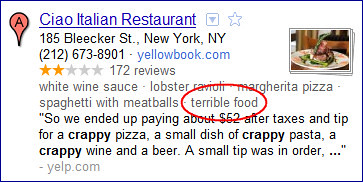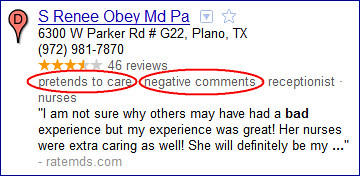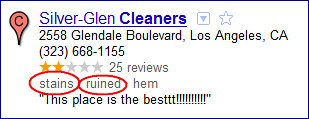Google has just announced that they’ve launched “Descriptive Terms” to appear with business listings in map search results. According to them, these descriptive terms are some of the most common terms found in user reviews, blogs, web pages and other online references which describe the business. For instance, if you search for “Barbeque Restaurants”, you might see a business which lists such items as “banana pudding”, “pork chops”, “texas style”, “baked potato” and “chicken poppers”:
So, the cool part of this idea is that the feature will highlight user-generated terms which are frequently used in reference to the business. This is a type of an ontology formed by the vox populi, or common man. More properly, these Descriptive Terms begin forming what’s known as a “folksonomy“, which started coming into vogue with social media, particularly around the concept of tag clouds.
(It’s very slightly ironic that Google Maps has now deployed what are essentially small tag clouds with business listings, since I’ve heard some Google Engineers mildly disparage tag clouds as being potentially un-userfriendly and potentially bad on sites in some cases!)
But, the really UNCOOL part of the new Descriptive Terms is that Google appears to’ve launched these willy-nilly without properly safeguarding against sensitive/bad terms that they can end up highlighting.
With very minor testing, I can see numerous instances where the terms selected by the algorithm are inappropriate and unfairly damaging to the businesses.
How would you like to have your restaurant business characterized with the term “terrible food”, culled out of the review by a disatisfied customer?
Or, if you’re a towing company where you’re often despised by those whom are towed, yet liked by property owners, you might have a lot of negative reviews which could get your business attractive labels like “steal” and “complaint”:
Or, if you were a doctor, how would you feel about being tagged with phrases like “pretends to care” — and if you’re a dry cleaner, how about getting displayed with “stains” and “ruined”:
Even more entertaining, if you were a hotel, would you like your listing sporting such amenities as “bed bugs”?!?
It’s not particularly surprising that Google Maps has launched this without really caring about how this could negatively impact a lot of businesses. Quite a few of the random things that the algorithms are pulling as sample information to display with listings are potentially bad. For instance, not only are reviews snippets displayed below listings, but the same negative review can get sucked into the tooltip that is displayed when the business’s icons are moused-over on the maps (see the example I pulled just a few days ago where penises are featured over a university).
Perhaps I shouldn’t call out how bad Google’s cleanup of this new feature is, because I’ve no doubt that it will result in more business for me. Just for example, I’ve helped out a business recently which had received a negative review from a disgruntled former employee, so the business’s tooltip labeled the company location as a “sweatshop”.
However, I am very concerned that this sort of casual disregard for what is likely to happen is continuing, and it’s going to result in a lot more malicious behavior among competitors as well as small businesses reacting by posting more shill reviews in self-defense.
Since Google apparently deployed this with no mechanism for businesses to be able to modify how their own listing information may appear in search results, companies have no other real choice than to get shill reviews posted on their behalf in order to try to offset negative content.
Google can get up on a high-horse and preach about how companies should not post false reviews, but if your listing in the search results is labeling you as a bad guy, then you must do something fast or lose your business. A major issue with the current arrangement is that it revokes your ability to take negative consumer feedback, improve your customer service, and improve business. If you get labeled as a bad-guy at the outset, you no longer have customers for whom to improve service.
The reviews and ratings arena has already seen more than its fair share of malicious/false reviews posted by unethical competitors, too, and the increased prominence of descriptive terms derived from reviews will result in more offensive behavior as small businesses notice how the system works. As it stands, all they need to do is post a very few false reviews in Google itself, in other reviews sites, or even on blogs they control and they can viciously slice off business from their competitor!
At the moment, it looks to me like all it takes is about two shill reviews of “bed bugs” to totally ruin a hotel. And, it’s even easier to damn a business with faint praise — check out the hotels which are now labeled with “small rooms” and “tiny rooms” in Manhattan, NYC (where virtually all the hotel rooms are small).
It’s disappointing to see such a feature rolled out without some mechanism in place for handling these situations. It’s not all that surprising, considering how Google Maps employees have told us that there is no customer testing performed for these products with business owners.
The sad part about it is that these Descriptive Terms mostly seem completely useless from a consumer point of view. When searching for “theatres” its completely not a surprise that they have “bathrooms”. Really, Google? That’s the term you wanted to highlight? It’s not helpful for “nightclubs” to display the names of bands that previously played there. It’s no surprise that “seafood restaurants” might have “new england clam chowder” or “lobster rolls” nor is it surprising to find “dentists” who offer “root canals”.
The bizarre random terms that are showing up are not helpful, either. “Front desk”, “told me”, “conveniently located”, and more. It’s hard to believe that they performed usability or user-experience testing with these at all before launching them.









 ShareThis
ShareThis
One has to wonder whether this is an intentional move to promote all business owners to use Google Boost.
Although, I am certain the Google would deny that.
Excellent post, Chris!
In line with Google tradition, if you don’t use Boost and they want you to, they will create a situation where using the paid service is likely to be better than the “organic” alternatives (or at least appear to be safer). I wouldn’t be surprised if the functionality to edit the user supplied tags comes as part of the Boost program.
Along the way they make a joke of themselves to the 20% who notice, but that 80% is enough for Googlers to write off any criticisms. Again this new style of Google must be challenging the patience of old school search quality people still hoping Google has some soul left.
[…] Chris Silver Smith shares several additional examples of negative terms appearing in business listings, including a doctor’s listing that includes […]
I disagree with this in a big way. Not only is this helpful to the user but it also isn’t anything new. Notice the stars that are used to review a site/service/business they all indicate roughly the same information that the negative words give. Frankly people seeing 1, 2, or even 3 stars are likely to view some of those reviews and they’ll come away with the same opinion. Google is just giving the user what they want to make decisions. Just like the +1 button.
[…] terms commonly seen in your reviews. If, however, bad reviews are a problem for your company, there could be some issues. Google Mobile Growth Mirrors Early Organic […]
[…] news for local businesses – right? Not so fast. As Chris Silver Smith points out in a thoughtful blog on these descriptive terms, this can go horribly wrong. If Google decides that comments from a handful of bad reviews are […]
Haha… If I owned a hotel I may not want “Bed Bugs’ appearing in my search results, but as a consumer I am very happy that Google is identifying and sharing this!
Great post Chris!
I can’t believe that Google is doing this. One of my clients listings now has the name of the restaurant that it used to be (over two years ago) as a suggestion due to the fact people like to compare it to the old location. Not ideal….
It is interesting to note that all the Place pages that have “What people are saying” section have descriptive terms appearing in the Google Maps search and the other way round. I am not sure what the other sources are, but reviews definitely count a lot, and at the same time it seems like the terms are picked almost (or totally) completely by prevalence and not by relevancy to the main category/ies the listing is associated with, which is probably the main reason for that whole mess.
With these “Descriptive Terms” Google is yet again opening themselves up to more defamation lawsuits, just like those they’re getting for auto-complete. Their claim/defense that it’s just computer algorithms isn’t holding up well in court.
What’s worse, it opens another avenue for “black ops SEO” where a competitor would use SEO to boost negative reviews. Not only would it get the bad review toward the top of search results but would brand their competitor with negative descriptive terms.
[…] bon article sur les dangers que vont avoir l’utilisation des tags sur les résultats places (post) en expliquant que certains commerces allaient avoir des mots clés négatifs qui vont ressortir […]
Ben, it’s helpful for consumers to see phrases like “front desk”, “told me”, and other random stuff called out?
I’ll grant you that I see some phrases that would be useful in helping select businesses, but there’s also a lot of random trash being picked up by the algorithm.
For the tow truck company, the property owners who need cars towed from their properties probably like the service, but they’re not as motivated to add reviews — not as motivated as those who have been towed. So, the reviews there might hurt them from being selected by more property owners while not reflecting their actual quality of service. The callout descriptive terms make it much worse than merely user reviews, too.
A valid question would be what’s the “statute of limitations” for how old the material should be before Google will stop bubbling it to the top. In the case of the hotel I outlined, I believe the user reviews were two years old — subsequent reviews appear positive, so we might reasonably assume that the hotel got rid of any possible bedbug infestations in the meantime. The Google algo doesn’t take this into account. Should the business be painted with this forever? When will Google forgive them?
The potential for malice from competitors is very present with this, as I outlined.
Considering these points, can you still say that this is all good for consumers?
Luke, Matt McGee outlined over on SearchEngineLand.com how competitor brandnames were showing up on hotel listings in Hawaii. I’d assume that reviews were comparing the hotels to other competitors, but the result is a bad consequence.
Frank, I agree completely.
I agree with Ben. The entire basis of online reviews such as Yelp which dominate the internet is the star system. I’m sure every business that gets three stars or below is pissed about it, but they should probably focus on upping their service.
Of course people who use review sites will eventually learn that people give negative reviews for different reasons. Lets be honest, almost every single restaurant in the world has at least one five star and one one star review. This descriptions tool is a way for users to give the stars more context by discerning summaries of what users are saying.
I think in this case, its not a big deal and certainly not an affront to small businesses. As a user, I think it will be a helpful feature. And ultimately that’s who Google is trying to serve.
Chris,
Your examples in this post are both hilarious and disturbing. Have to agree with you about the randomness of this not being at all helpful, and I genuinely feel sorry for some of the businesses featured, but at the same time, I can’t help laughing at the goofiness of Google for launching this without a look at what the results might be. If they are going to keep this, they should set the number of occurrences much, much higher for a word to qualify as a truly descriptive term. Thanks for putting an exclamation point at the end of my work day.
Patrick, I think there’s a big difference between stars generated by adding together many user ratings, versus text labels derived from just a small handful of mentions. And, the mentions don’t all come from user reviews — they could come from blog posts, other website mentions, etc. They could come from your competitor’s site where he says trash about you.
Many businesses have been and are sensitive about their reviews and rating stars, and you’re right that if they validly get dinged by many users they have to live with the result.
But, it’s still quite a bit different from having these labels randomly applied to your business. If five consumers stated in reviews that their hotel rooms were “free of bedbugs”, “they didn’t have bedbugs”, “didn’t see any bedbugs”, “bedbugs were not to be found”, and “they felt safe from bedbugs” — the current algorithm might very well label the business with “bedbugs”.
This would certainly be an affront to any business, and I’d argue that it’s not at all helpful to consumers the way it’s currently implemented.
[…] another concern I have is this week’s announcement about “Descriptive Terms” being added to business listings, makes it even more enticing for highly unethical companies to spam competitors Place pages with […]
It reminds me the Google Bombing some years ago! Now, anybody can write whatever –true or false- about local places… and Mr. Google will trust on that!
There´s no doubt what Google is trying to do is “improving” the search engine –human- experience, base on the (social) comments from the Web itself. What maybe they SHOULD do is an algorithm to filter offensive words or these unless descriptive terms –as you point.
In my personal case, I prefer to read comments from other sites like TripAdvisor… but mostly of people probably won´t.
I don’t know if they really hates –or not- small businesses. The fact is there is a LOT of local places in the world in where Google can make (more) money…
Interesting, I did not know this. I agree that it seems like they might of rolled this out without really thinking this through. Reviews are tough to combat as well, since about 20 percent or so can be rubbish and totally false.
Chris,
Funny and sad examples. I really feel for the example you gave where the company had an overall good review profile. Some of the examples you provided they all had negative review profiles and so the descriptive terms where getting pulled from there.
I guess now SMB’s have to educate their clients on “how” to leave a review and help them “optimize” their reviews too. Not sure if this possible, but something to be aware off.
I hope Google really looks to make sure the DT’s are pulling the right terms.
Kinda scary.
[…] have added the somewhat-controversial descriptive terms underneath the star […]
[…] think that these tooltips may now be more prominently featuring the Descriptive Terms — the keywords displayed with business listings in Google Maps which I earlier pointed out as being frequently problematic due to them often highlighting negative […]